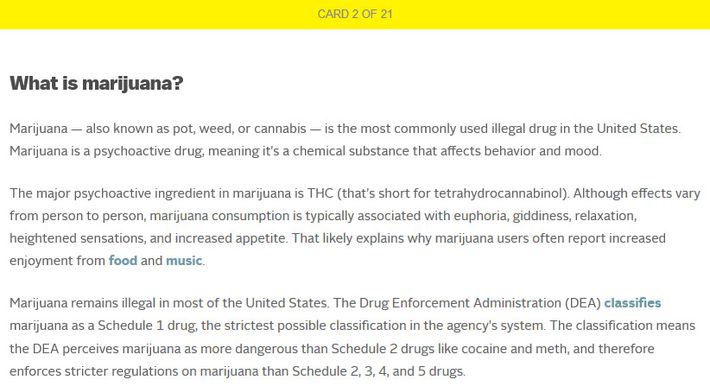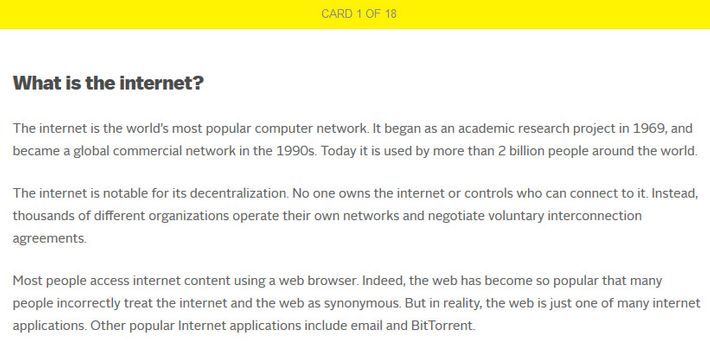
When the Washington Post’s Wonkblog whiz Ezra Klein left the paper to start his own explanatory journalism site, he told New York’s Benjamin Wallace, “My interest here is entirely about building a truly significant, central news property for the digital age, that if it succeeds — and it definitely might not — will be a huge company that is devoted to helping people, like a Wikipedia or New York Times.” Those two reference points turned out to be quite literal: In addition to newspaper-style reported features on subjects like single-payer health care in Vermont (with fancier charts), Vox.com features base-level background information on the subjects at hand in slideshow form (“card stacks”), answering questions like “What is marijuana?” and “Who is Chris Christie?” (There’s also a little BuzzFeed thrown in, e.g., “9 questions you were too embarrassed to ask about Gwyneth Paltrow.”)
Klein is confident it all can coexist. “If media professionals look at this and think, That’s ridiculous, I already know all of this, that’s wonderful for us,” he told Daily Intelligencer today, reflecting on this week’s launch. “The more folks in the media feel like it’s beneath them to answers questions like, ‘What is marijuana?’ or ‘What is Ukraine?’ the more we don’t have to compete with them.”
You’re almost through week one — how do you feel about it?
I am really, really happy with week one, but I’d be really unhappy if week two isn’t better than week one, and if week three isn’t better than week two.
How did you celebrate the launch?
People had a little drink in the office, but I don’t believe in celebratory launch parties. The launch is something to be proud of, but it isn’t success. It’s a necessary but not sufficient condition.
Visitors to Wonkblog were reportedly somewhere near 3 million a month. How long do you think before Vox will be matching or exceeding those numbers?
I am incredibly happy with where our traffic is this week. We’re in better shape than I would have thought. But there’s nothing we can say from that, really. If I’m sitting around exulting over traffic data, I’m an idiot.

The cards have come in for a little bit of mockery already from media people — things like “What is marijuana?” and “What is the internet?” How do you decide where the line is for how basic these are going to get, in terms of subject matter?
We want them very basic. I am ecstatic over that kind of mockery. If media professionals look at this and think, That’s ridiculous, I already know all of this, that’s wonderful for us. It’s great on two levels. One is that if we are not aiming beneath our colleagues’ knowledge level, we’re making a huge mistake. We’re leaving tons of readers behind. Two: The more folks in the media feel like it’s beneath them to answers questions like, “What is marijuana?” or “What is Ukraine?” the more we don’t have to compete with them.
I am very concerned about the card stacks delivering on their promise. And that promise is that if you read them you’ll really understand what’s going on. You don’t have to read everything; there’s a table of contents. We want to be able to take you from not knowing anything about a subject to having a working understanding of it. That means beginning at the beginning.
One thing that’s great about reading online that you don’t get from a book or newspaper is that you can easily open a new tab — why not just let readers learn the basics elsewhere and then come back for where you can add value? Why does it have to be your version? Why not just Wikipedia?
It doesn’t have to be our version. And it still will be Wikipedia out there. We are offering one cut at these topics. We did not start this project attempting to firebomb all the servers that hold Wikipedia information. We started this project by trying to build stuff that would be useful for people.
Every newspaper in the country covers stories that other newspapers cover. Every industry is filled with people who are competing to do the best job providing a particular service. Domino’s exists even though Pizza Hut exists, and both of them can provide a pizza in a pretty reasonable amount of time.
I think it’s weird that the news cedes so much ground to Wikipedia. That isn’t true in other informational sectors. If you get a rash, there is a page on Wikipedia about rashes. But you don’t go to that page. You go to the page on WebMD or the Mayo Clinic or whatever. That page is kept up by people who are experts in rashes. You go there because of the quality of writing and information and the organization standing behind it. I’ve always thought it was weird that we don’t do more of that for our readers in the news.
A lot of the idea is that the card stacks add value to the news coverage. And the news coverage creates curiosity that leads people to the card stacks. The idea is that things work together rather than just trying to compete with Wikipedia or just trying to compete with news outlets. We have two products that help make the other one better.
Is there an SEO play involved here? The web seems to have moved away from the Huffington Post “What time is the Super Bowl?” stuff in favor of social and sharing …
People always bring up that Huffington Post article. What I think is missed in that discussion is that that article is super useful. Every year I need to know when the Super Bowl is. I always forget. I often find that article. It tells me exactly what time the Super Bowl is.
Sometimes I think in the media there can be a weird condescension toward the idea of providing people simple useful info they need in a simple format.We shouldn’t be laughing at the idea that Huffington Post managed to provide a service that people all over the internet needed provided. That’s something to learn from.

Can we expect more populist fluff like today’s Gwyneth Paltrow explainer, in addition to the constant flow of serious wonkery?
We don’t think that is populist fluff. I really don’t like the way people look down on culture stories. Culture matters! There’s no reason people shouldn’t want to know about these stories, and we don’t think we’re slumming it when we tell them.
Can you explain — in the most concrete terms possible, like a Vox explainer — what’s so great about Chorus, the company’s content management system?
I cannot. In part, because some of it is beyond me. We’re dealing with a really, really powerful technology for how to publish things. But more broadly because there are cool things that if Vox Media would like to reveal as a corporate matter, that should be up to them.
The Times said, “Vox’s formats attract attention directly, so the site does not have to turn to gimmicky features like quizzes, teasing headlines or lists to generate traffic through Facebook or Twitter.” Is that something you agree with?
I don’t think content management systems draw in readers. I think great content draws in readers.
Did you learn anything from watching the launch of Nate Silver’s FiveThirtyEight?
There’s been this competitive class created where somehow the Vox launch and the FiveThirtyEight launch are connected and they’re not. Felix Salmon had a nice piece on this. He made this point that these are sites creating market for a particular kind of journalism. These are the sites that are helping to create talent or training. If there’s a kid out there reading FiveThirtyEight and they’re a 19-year-old in college and now they’ve decided to learn really strong data journalism skills, that is great for me because that’s somebody maybe I can hire in a couple of years that wouldn’t have been there otherwise. There’s been this whole thing trying to imagine that we’re locked in some zero sum game, but traffic on the internet is not zero sum.
Have you been surprised at all at the shift from hyping you and Nate Silver as saviors of journalism to trying take you down a peg now that you’re the bosses?
I’ve been on the internet for a little while now. I’ve seen this stuff come and go. My view on this stuff is that you’ve gotta step back a little bit and not get too hyped. There is a world in which we can launch and have a terrible reception from the media but end up being a wildly successful website. Think back a couple years to BuzzFeed, which was initially mocked. It’s a juggernaut right now.
Conversely, you can imagine a launch where we are lauded by the media and everyone loves us, and then we don’t get the readership we need. I’m not sure great buzz from the media helps predict whether or not we will succeed in our goals and I’m not sure negative buzz predicts it. Ultimately we need a lot more folks reading us than media people.
I think a problem is journalism is being overly concerned with writing for other journalists. Twitter, in particular. Journalists have so engaged on Twitter and it’s so empowering and gratifying to write an article your peers really enjoy that you can forget that your peers are very different from your readers. It can be a little bit problematic.
What do you make of the criticisms that these sites are too white and male, as in The Guardian and the New Statesman?
On gender ratio, our editorial staff is not exactly 50-50, but we’re getting there and I am pretty committed to getting us there. Racial diversity is something we need to do a better job on. We focused on it early on but didn’t succeed in the way that we should have. We had some hires that we really hoped would work that fell through for totally normal reasons and then we didn’t correct quickly enough.
Look, you have to be committed to it. If you’re not, you get into the problem we began to have: People feel that maybe it’s not a culture that cares about it. And that’s really dangerous. Then it makes it hard for you to fix the problem in the future. If you really end up with a place where you’ve just got one kind of person writing, then your ability to see stories and your ability to do reporting and reach audiences becomes constricted, just because you don’t have enough capacity to see behind your own perspective. That gets really dangerous. It is a thing I think about and that we are working on a lot. I think we’ll be in a better place a couple months from now than we are today. It is something you have to just keep pressing on.
What did you take away from the dust-up over the hiring of [controversial writer on LGBT issues] Brandon Ambrosino?
I took away … [Long pause.] I took away that a lot of people have very strong feelings about his writing. He’s offended some folks and as often happens with these things, he also, I don’t think got the most nuanced interpretation of what he was doing. He’s a young and inexperienced writer. I hired him not because he was a correspondent meant to be writing aggressive takes, but that he had a lot of talent as a writer in general. Our fellows program is meant to take people with a lot of talent and give them training in our kind of work. That’s what we’re going to try to do.
I think he’s writing an article as we speak. He’s a really good guy. People felt that he was trying to offend or troll them, and I know that’s not how he saw his work.
Editor Marty Baron recently gave an account of your departure from the Post, in which he said that you “wanted to create an entirely new news organization, something entirely separate from the Post. And that he would be in charge of it — he would be the president, the CEO, the editor-in-chief, he would select the technology, he would select the advertising chief — pretty much everything. And it would exist outside the framework of The Washington Post.” How accurate is that?
I think there are some numbers that surprised me in that. I did not ever go to the Post and say I want 10 percent of your budget. The eight-figure numbers that are around are silly.
But he’s right about something big there. I did think that we needed to build an organization from the ground up, dedicated to doing the things that I wanted to do, which is creating this persistent explanatory content.
I genuinely do love the Post. I’m genuinely, incredibly proud of and grateful for my five years there. It continues to be an awesome place. Look at the people they hired recently: Alyssa Rosenberg, Matt O’Brien, Adam Kushner, Radley Balko — just an incredible slew of really, really, really strong web writers. They’re an awesome organization at being the Washington Post. When I went to Marty, I told him that I wanted to do this other thing. The Post’s decision that it wasn’t the right thing for them was a totally reasonable and probably correct decision.
I hate that this constantly gets put as this fight between me and the Post or me making a negative judgment on the Post. The Post is a really great place. I don’t think Wonkblog ever could have taken root anywhere else. It was an incredible amount of support from Post leadership that made it happen. I did ultimately want to try to do something that was just an unusual kind of product.
Obviously you’re slammed now, but any chance you’ll be getting back to your book anytime soon?
[Laughs.] That is definitely one of the things that is on my docket.
Anything else?
The big thing I would say is that for all of these new organizations, for us, for Nate, for Glenn [Greenwald], for Kara [Swisher] and [Walt Mossberg] over at Recode, and not just the new organizations — Businessweek just brought in Justin Smith, The Atlantic is launching new verticals pretty rapidly, Quartz is just over a year old — you’ve gotta give this stuff some time to play out. People are just constantly pronouncing on business strategies or content strategies. We’re all going to be different organizations a year from now than we are today.
People should judge the content, but the thing that has been most striking to me is how rapidly we are learning. It is just like drinking from a fire hose every day. I think a lot of cool things are going to happen in the broader world of media in the next year or two or five years. Sometimes I read this stuff and I’m just stunned by the pessimism in it. I’m just stunned by how much people feel like nothing is ever going to work out. Meanwhile, we have blog posts and feature articles that are getting literally millions of views from people they never could have reached before.
I’m super excited. I think other people should be a little more excited, too.
This interview has been condensed and edited.





























